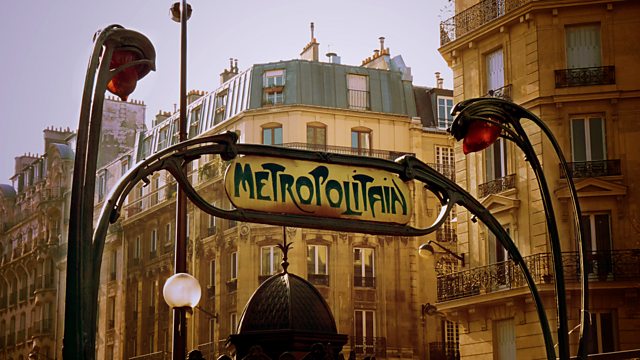
Flanerie - a view of Paris
An imagined serendipitous journey through Paris's streets, past and present, told through its literature and music, with the actors Tamsin Greig and Neil Pearson.
An imagined serendipitous journey through Paris's streets, past and present, told through its literature and music, with the actors Tamsin Greig and Neil Pearson
The Flâneur - "that aimless stroller who loses himself in the crowd, who has no destination and goes wherever caprice or curiosity directs his or her steps".
It was Baudelaire, in his "Fleurs du Mal" in the late 19th century, who created flânerie as a literary ideal for evoking the patterns and emotions of modern urban life in Paris; but the concept of the detached observer - casual, directionless, voyeuristic - who finds refuge within the crowded streets of the capital, had been around for some time. Balzac, writing in the years before the advent of Haussman's modern cityscape, had described flânerie as "the gastronomy of the eye". Later, the German writer and social-critic, Walter Benjamin, would use the experiences of the Parisian flâneur as illustrations for socio-political commentary.
In this edition of Words and Music, we - much in the spirit of the flâneur - take a casual musical and literary journey through Paris's imagined streets. Glimpses of buildings bring to mind the city's great history and its inhabitants; its poets, writers and composers. Imagine sauntering past Notre Dame and the neighbouring university: and the ribaldry of medieval Paris fills the mind's eye, evoking the words of Villon and Rabelais; of Victor Hugo describing the medieval skyline and the festive sound of the medieval bells.
Next on to the Louvre and the Marais, and echoes of the grandeur of Paris during the age of the Sun King; of Marie de Rabutin-Chantal de Sévingné's famous letters; of the music of Lully and Charpentier. Turn another corner, and find the youthful Marin Marais, lost and bewildered by the banks of the Seine - his voice, post-pubescent - his services no longer required in the Royal Chapel.
A hundred years on, and in the wretched area of Sainte-Antoine, Charles Dickens watches the abject poor seemingly rehearse events for one the city's least glorious moments; their hands and clothes stained with red wine, like blood.
Balzac lists the varied "physiognomy" of the Parisian back streets in the years just before Haussmann re-invented the city - we follow him into some of Paris's more forbidding and darker haunts; while later - into the Belle Époque and beyond - coursing among the newer buildings, parks and thoroughfares - Baudelaire, Proust and Zola observe Parisian life with a multitude of senses and a painterly eye. As do Fauré, Verlaine and Debussy.
"Among all cities, there is none more associated with the book than Paris", wrote Walter Benjamin. Ernest Hemingway finds refuge in one of the city's necessary cafes, watching and transcribing, while Beria and Bechet set the same thoughts to music.
Finally, our serendipitous journey presents an aspect of the modern Paris: not the beautiful; nor the bustling, fashionable and vibrant; but urban nonetheless. The city at its edge - people at the periphery. The world in the Banlieue: of graffiti and the blues.
Last on
More episodes
Previous
Next
Music Played
Timings (where shown) are from the start of the programme in hours and minutes
-
![]() 00:00
00:00Frederick Delius
Paris: Song of a Great City
Performer: Bournemouth Symphony Orchestra, Richard Hickox (conductor).- EMI 49932.
- Tr 3.
-
EE Cummings
Paris; the April sunset completely utters, read by Neil Pearson
Edmund White
The Flaneur - A stroll through the paradoxes of Paris, read by Tamsin Greig and Neil Pearson
![]() 00:06
00:06Guillaume de Machaut
Messe de Notre Dame - Kyrie
Performer: The Hilliard Ensemble, Paul Hillier (conductor).- Hyperion CDA 66358.
- Tr 1.
François Rabelais
Pantagruel and Gargantua, read by Neil Pearson
![]() 00:09
00:09Claude Debussy
Trois Ballades de François Villon
Performer: Christopher Maltman (baritone), Malcolm Martineau (piano).- Hyperion CDA67357.
- Tr 21.
![]() 00:11
00:11Clément Janequin
Voulez ouyr les cris de Paris
Performer: Ensemble Clément Janequin.- Harmonia Mundi HMT901072.
- Tr 1.
Victor Hugo
The Hunchback of Notre Dame (excerpt), read by Tamsin Greig
![]() 00:12
00:12Frederick Delius
Paris: Song of a Great City
Performer: Bournemouth Symphony Orchestra, Richard Hickox (conductor).- EMI 49932.
- Tr 3.
![]() 00:14
00:14Jean‐Baptiste Lully
Overture and Act 3 Scene 4, ‘Le Sommeil’
Singer: Gilles Ragon (Counter tenor). Ensemble: Les Arts Florissants. Conductor: William Christie.- HARMONIA MUNDI 7488192632.
- Tr 1.
The Letters of Marie de Rabutin-Chantal de Sévingné
Excerpt read by Tamsin Greig
Pascal Quignard
All the Mornings of the world (excerpt), read by Neil Pearson
![]() 00:24
00:24Marin Marais
Pieces de Viole: Book 4 Le Reveuse
Performer: Jordi Savall (viole).- ALIA VOX AVSA9872.
- CD4 Tr8.
![]() 00:28
00:28Jean-Baptiste Davaux
Symphonie Concertante Mêlée D'Airs Patriotiques for 2 violins & orchestra in G - 1st mvt
Performer: Werner Ehrhardt (violin), Andrea Keller (violin), Concerto Köln.- CAPRICCIO 10280.
- Tr1.
Charles Dickens
A Tale of Two Cities (excerpt), read by Tamsin Greig
![]() 00:34
00:34Hector Berlioz
Lélio, Op. 14b - Movement V: La harpe éolienne
Performer: Berlin Komische Oper Orchestra, Rolf Reuter (conductor).- BERLIN CLASSICS 002149BC.
- Tr 10.
![]() 00:37
00:37Giacomo Puccini
La Boheme - Act 2 Opening
Performer: Orchestra e coro dell'Accademia di Santa Ceclia, Tullio Serafin (conductor).- DECCA 4255342.
- Tr 11.
Balzac
Ferragus (excerpt), read by Neil Pearson
![]() 00:38
00:38Frédéric Chopin
Piano Sonata No 2 in Bb minor Op35 - 4. Finale
Performer: Nikita Magaloff (piano).- PHILIPS 456 376-2.
- Tr8.
![]() 00:40
00:40Giacomo Puccini
La Boheme - Act 3 duet "Mimi - Speravo di trovarvi qui"
Performer: Renata Tebaldi (soprano), Ettore Bestianini (baritone), Orchestra e coro dell'Accademia di Santa Ceclia, Tullio Serafin (conductor).- DECCA 4255342.
- CD2 Tr3.
![]() 00:45
00:45Frederick Delius
Paris: Song of a Great City
Performer: Bournemouth Symphony Orchestra, Richard Hickox (conductor).- EMI 49932.
- Tr 3.
Baudelaire
Fleurs du Mal: To a Passer-By, read by Tamsin Greig and Neil Pearson
![]() 00:46
00:46Gabriel Fauré
La bonne chanson, Op 61 - III "La lune blanche luit dans les bois"
Performer: Camille Maurane (baritone), Lily Bienvenu (piano).- PHILIPS 438 970 -2.
- Tr 10.
![]() 00:49
00:49Claude Debussy
Petite Suite - I. En Bateau (orchestrated by Henri Büsser)
Performer: Orchestre. National de L'O.R.T.F, Jean Martinon (conductor).- EMI CDM7695892.
- Tr 7.
Marcel Proust
Swanns Way I (Vol. 1 of Remembrance of Things Past), read by Neil Pearson
![]() 00:53
00:53Jacques Offenbach
Overture "La Belle Hélène"
Performer: City of Birmingham Symphony Orchestra, Louis Frémaux (conductor).- EMI CDM7630242.
- Tr 14.
Emile Zola
The Ladies Delight, read by Tamsin Greig
![]() 00:57
00:57Gustave Charpentier
Louise Act 3 - "Depuis le jour"
Singer: Ileana Cotrubaș. Singer: Plácido Domingo. Orchestra: Philharmonia Orchestra. Conductor: Georges Prêtre.- SONY S3K 46429.
- 11.
![]() 01:01
01:01Danse les Musettes a Paris
"Danse les Musettes a Paris"
Performer: Germaine Beria, Les Vagabonds.- FREMEAUX & ASSOCIÉS FA 005.
- Tr 2.
Ernest Hemingway
A Moveable Feast (excerpt), read by Neil Pearson
![]() 01:02
01:02Sidney Bechet
Petite Fleur
Performer: Sidney Bechet.- EUROPE 1710440.
- Tr 5.
Jeanine Basinger
"A Woman's View: How Hollywood Spoke to Women 1930-1960", (excerpt) read by Tamsin Greig
![]() 01:06
01:06U&G Hermosa
La Lambada
Performer: Koama.- TELSTAR TTVCD3067.
- CD2 Tr 8.
Mehdi Charef
Tea in the Harem (excerpt), read by Tamsin Greig
![]() 01:07
01:07Jacques Higelin
Banlieue Boogie Blues
Performer: Jacques Higelin.- EMI 796482.
- Tr 2.
![]() 01:12
01:12Frederick Delius
Paris: Song of a Great City
Performer: Bournemouth Symphony Orchestra, Richard Hickox (conductor).- EMI 49932.
- Tr 3.
James Fenton
In Paris with you (excerpt), read by Neil Pearson
Producer's Note
The Flâneur - "that aimless stroller who loses himself in the crowd, who has no destination and goes wherever caprice or curiosity directs his or her steps".
��
It was Baudelaire, in his "Fleurs du Mal" in the late 19th century,�� who created flâneurie as a literary ideal for evoking the patterns and emotions of modern urban life in Paris; but the concept of the detached observer - casual, directionless, voyeuristic - who finds refuge within the crowded streets of the capital, had been around for some time. Balzac, writing in the years before the advent of Haussman's modern cityscape, had described flâneurie as "the gastronomy of the eye". Later, the German writer and social-critic, Walter Benjamin, would use the experiences of the Parisian flâneur as illustrations for socio-political commentary.
��
In this edition of Words and Music, we - much in the spirit of the flâneur - take a casual�� musical and literary journey through Paris's imagined streets. Glimpses of buildings bring to mind the city's great history and its inhabitants; its poets, writers and composers. Imagine sauntering past Notre Dame and the neighbouring university: and the ribaldry of medieval Paris fills the mind's eye, evoking the words of Villon and Rabelais; of Victor Hugo describing the medieval skyline and the festive sound of the medieval bells.
��
Next on to the Louvre and the Marais, and echoes of the grandeur of Paris during the age of the Sun King;�� of Marie de Rabutin-Chantal de Sévingné's famous letters; of the music of Lully and Charpentier. Turn another corner, and find the youthful Marin Marais, lost and bewildered by the banks of the Seine - his voice, post-pubescent - his services no longer required in the Royal Chapel.
��
A hundred years on, and in the wretched area of Sainte-Antoine, Charles Dickens watches the abject poor seemingly rehearse events for one the city's least glorious moments; their hands and clothes stained with red wine, like blood.
��
Balzac lists the varied "physiognomy" of the Parisian back streets in the years just before Haussmann re-invented the city - we follow him into some of Paris's more forbidding and darker haunts; while later - into the Belle Époque and beyond - coursing among the newer buildings, parks and thoroughfares - Baudelaire, Proust and Zola observe Parisian life with a multitude of senses and a painterly eye. As do Fauré, Verlaine and Debussy.
��
"Among all cities, there is none more associated with the book than Paris", wrote Walter Benjamin. Ernest Hemingway finds refuge in one of the city's necessary cafes, watching and transcribing, while Beria and Bechet set the same thoughts to music.
��
Finally, our serendipitous journey presents an aspect of the modern Paris. Not the beautiful; nor the bustling, fashionable and vibrant; but urban nonetheless. The city at its edge - people at the periphery. The world in the Banlieue: of graffiti and the blues.
Chris Wines (producer)
Broadcasts
- Sun 11 May 2014 17:30�鶹�� Radio 3
- Sun 17 Feb 2019 18:15�鶹�� Radio 3
Featured in...
![]()
Arts
Creativity, performance, debate
The hidden history of plant-based diets
Books website
Get closer to books with in-depth articles, quizzes and our picks from radio & TV.
Gallery




